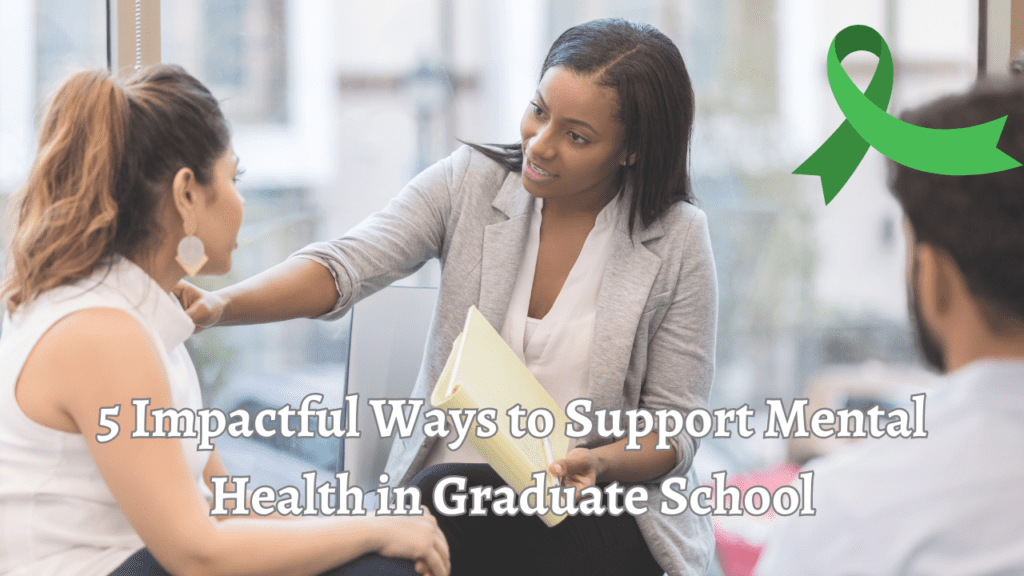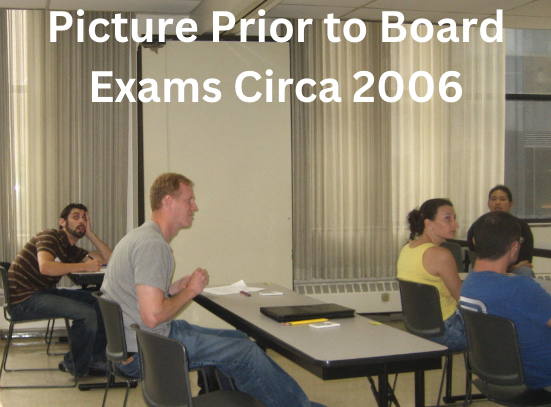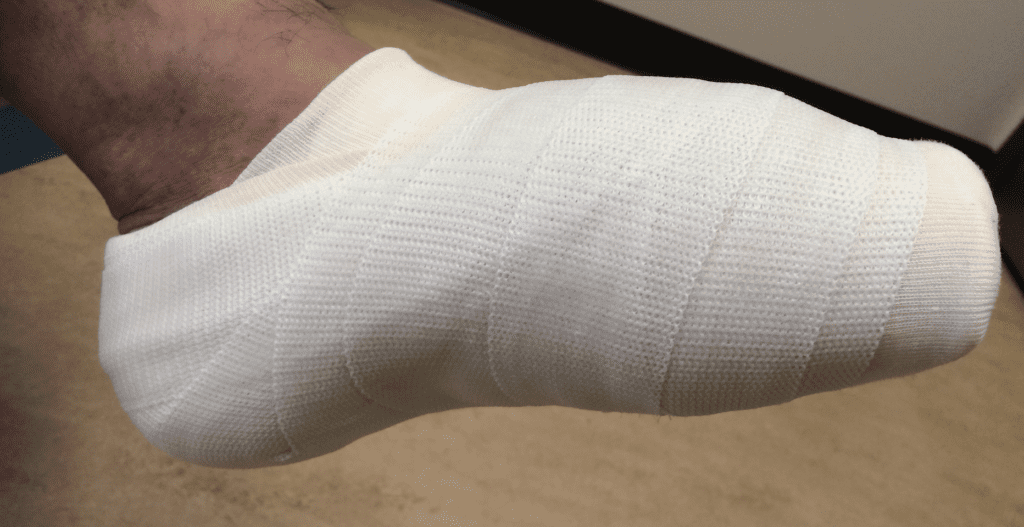Authored by Dr. Leland Jaffe, Associate Dean and Professor; Published on July 22, 2024
Graduate school is an exciting yet demanding journey that can affect your mental health. Balancing coursework, research, and personal life creates a unique set of challenges that can feel overwhelming. Prioritizing your mental well-being is crucial to succeed in this critical academic phase.
This post outlines five actionable ways to maintain and boost your mental health while navigating the rigors of graduate school. You’ll learn practical tips to help manage stress, build a support network, and create a healthier balance. Taking care of your mental health isn’t just important; it’s essential for your academic and personal success. Let’s explore effective strategies that can make a real difference.
1. Establish a Routine
Having a structured daily schedule can be a lifesaver for graduate students. It provides a sense of normalcy and predictability in what can often feel like a chaotic and demanding environment. Let’s explore some effective ways to manage your time and ensure you make the most of your day.
Time Management Techniques
Effective time management is crucial for graduate students who juggle coursework, research, and personal life. Here are two powerful techniques that can help:
- Pomodoro Technique: This method involves breaking your work into 25-minute intervals, called “pomodoros,” followed by a 5-minute break. After four pomodoros, take a longer break of 15-30 minutes. This technique helps maintain focus and prevent burnout. You can learn more about the Pomodoro Technique here.
- Eisenhower Matrix: This matrix helps you prioritize tasks by urgency and importance. It’s divided into four quadrants. In medicine, we are used to triaging patients due to the severity of their condition, this is no different…
- Urgent and Important: Do these tasks immediately.
- Important, but Not Urgent: Schedule these tasks.
- Urgent, but Not Important: Delegate these tasks if possible.
- Neither Urgent nor Important: Eliminate these tasks.
By categorizing tasks this way, you can focus on what really matters. More details on the Eisenhower Matrix can be found here.
Incorporate Breaks and Leisure Activities
Taking regular breaks and engaging in leisure activities are equally important as working hard. Breaks help refresh your mind and enhance productivity. I will take short walks throughout the day, which helps to keep my focus! Here’s why you should incorporate them into your routine:
- Boosts Creativity: Stepping away from your work allows your brain to relax and can lead to moments of sudden inspiration or clarity.
- Improves Mental Health: Engaging in hobbies or leisure activities can reduce stress and anxiety. Whether it’s reading, exercising, or spending time with friends, these activities help recharge your energy.
- Increases Productivity: Contrary to what many believe, taking breaks actually makes you more productive. Short breaks can prevent burnout and keep your mind sharp throughout the day.
Establishing a routine isn’t just about being disciplined; it’s about making conscious choices that support your well-being and academic success. Stay organized, take breaks, and don’t forget to enjoy the journey!
2. Seek Professional Support (if needed)


Graduate school can be tough on your mental health. Balancing academics, research, and clinical training can be overwhelming. Finding the right support can make all the difference. Here are some ways to get professional help:
Counseling Services
Talking to a counselor can be incredibly helpful. Many universities offer free or low-cost counseling services for students. These services can help you manage stress, anxiety, and other mental health issues. You can usually schedule an appointment through your school’s health portal or by calling the counseling center directly.
Counselors are trained to listen and provide practical advice. They can help you work through personal challenges, academic pressure, or other issues. It’s a confidential space where you can express your feelings without judgment.
Accessing these resources is often straightforward. Many schools have dedicated services to support the well-being of graduate students. It’s worth checking out what your school offers and making that first appointment.
Peer Support Groups
Sometimes, talking to someone who’s going through the same thing can be comforting. Peer support groups allow you to share your experiences and hear from others who are in similar situations. These groups are usually student-led, providing a sense of community and mutual support.
Joining a peer support group can have multiple benefits:
- You can gain different perspectives on dealing with common issues.
- It’s a safe place to vent and feel understood.
- You can build friendships and feel less isolated.
Many universities organize these groups or workshops. For instance, Rutgers University offers various peer-led activities to support mental health. Don’t underestimate the power of community during challenging times.
By taking advantage of both professional counseling and peer support, you can develop a strong support system. Remember, seeking help is a sign of strength, not weakness. Your mental health is just as important as your academic achievements.
3. Practice Mindfulness and Stress Management
Graduate school can be a whirlwind of deadlines, research, and an endless stream of tasks. It’s easy to feel overwhelmed. However, incorporating mindfulness and stress management techniques into your daily routine can provide much-needed relief and mental clarity.
Meditation and Breathing Exercises
Meditation and breathing exercises are simple yet powerful ways to regulate emotions and reduce stress. These practices help center your mind and bring a sense of calm amidst the chaos. Here are a few techniques that you can easily integrate into your daily life:
- Deep Breathing: Focus on your breath, inhaling deeply through your nose, holding for a few seconds, and exhaling slowly through your mouth. This can calm your nervous system and reduce stress almost instantly. WebMD explains some simple breathing techniques that can help manage stress. I keep a yoga mat in my office, and even a quick 10-20-minute routine can be relaxing and effective!
- Box Breathing: Inhale for four seconds, hold for four seconds, exhale for four seconds, and pause for four seconds before repeating. This method is particularly effective for reducing anxiety and calming your mind.
- Mindfulness Meditation: Spend a few minutes each day sitting quietly and focusing on your breath or a mantra. This practice not only reduces stress but also increases your awareness and can improve overall well-being. NHS provides a guide to calming breathing exercises for stress.
Incorporating these practices can help create a buffer against the daily stresses of graduate school, and they can be done anywhere, at any time.
Physical Exercise as a Stress Reliever


Exercise is more than just a way to stay in shape; it plays a crucial role in mental health. Scientists have found that regular physical activity can significantly reduce symptoms of anxiety and depression, improve mood, and enhance cognitive function.
- Mental Health Benefits: Physical exercise releases endorphins, often referred to as “feel-good” hormones, which help reduce stress and anxiety. Plus, physical activity can increase brain-derived neurotrophic factor (BDNF), which supports brain health and cognitive function. Read more about the mental health benefits of exercise for a deeper understanding.
- Types of Exercises: You don’t need to be a gym enthusiast to reap the benefits. Simple activities like walking, jogging, or even yoga can have profound effects on your mental state. These exercises not only help to alleviate stress but also improve sleep quality and overall energy levels.
- Creating a Routine: Establish a consistent exercise routine that fits into your schedule. Whether it’s a morning jog, a lunchtime walk, or an evening yoga session, the key is consistency. Better Health discusses how regular physical activity can lead to better mental health and emotional well-being.
By making exercise a regular part of your life, you not only enhance your physical health but also build a strong foundation for managing the many stressors of graduate school.
4. Build a Supportive Community
Being in graduate school can feel like walking a tightrope—balancing academic pressures, personal commitments, and future career plans can be incredibly challenging. To stay grounded, it’s crucial to build a supportive community. Strong connections with peers and faculty can create a safety net that helps you thrive.
Networking and Socializing
Attending events and joining clubs are great ways to meet peers who understand what you’re going through. Feeling isolated can make the demanding environment of graduate school even harder, so surrounding yourself with like-minded individuals is essential.
- Attend Networking Events: Many academic institutions organize events specifically designed for students to meet each other. These can range from informal mixers to structured networking receptions.
- Join Clubs: There are often numerous student organizations focused on various interests—from academic subjects to hobbies. Joining these can provide a sense of belonging and shared purpose.
Building a network of friends and mentors can not only help you academically but also alleviate feelings of loneliness. For more tips, check out this opinion on creating community among grad students.
Creating Study Groups
Study groups can be lifesavers when it comes to both academic and social support. By collaborating with others, you can gain different perspectives on the subject matter and get help when you need it.
- Academic Support: When you’re stuck on a difficult concept, a study group can provide different approaches and solutions. Everyone has unique strengths, and together, you can cover more ground.
- Social Interaction: Studying together also gives you a chance to socialize. Talking about shared struggles can turn stress into manageable challenges. It’s like tackling a big project at work; when everyone pitches in, the task feels a lot less daunting.
The benefits of study groups are well-documented. For more insights, read about building your support system in grad school.
Building a supportive community is about creating a network of people who can offer help, advice, and companionship during this demanding time. By actively engaging in networking and forming study groups, you can create an environment that supports both your academic and emotional well-being.
5. Prioritize Self-Care
In graduate school, it’s easy to put your well-being on the back burner. However, taking the time to prioritize self-care can make all the difference in maintaining mental health. Let’s explore essential elements of self-care that can help you thrive.
Nutrition and Sleep
Good nutrition and sleep are the bedrock of good mental health. Making small changes can have a significant impact on your overall well-being.
- Maintain a Balanced Diet: A diet rich in fruits, vegetables, lean proteins, and whole grains can give you the energy you need. Limit sugar and caffeine intake, especially in the evening. For more insights, read about how diet affects sleep.
- Stay Hydrated: Drink plenty of water throughout the day. Dehydration can impact your mood and concentration.
- Create a Consistent Sleep Schedule: Try going to bed and waking up at the same time every day, even on weekends. This helps regulate your body’s internal clock. Learn more by checking out these sleep hygiene tips.
- Create a Relaxing Bedtime Routine: Activities like reading, meditating, or taking a warm bath can prepare your body for sleep. Find more strategies on sleep hygiene habits.
Engaging in Positive Activities


Frequent engagement in activities that bring you joy can alleviate stress and improve your mood. Here are a few suggestions worth trying:
- Volunteering: Helping others can provide a sense of purpose and community. It feels good to make a difference.
- Creative Hobbies: Whether it’s painting, writing, or playing music, creative activities are a great way to express yourself and relax.
- Physical Activities: Exercise, like yoga or dance, releases endorphins, the body’s natural feel-good chemicals. You don’t need to run a marathon; even a short walk can boost your mood.
- Social Connections: Spending time with friends and family can be incredibly grounding. Make time to connect with loved ones, either face-to-face or virtually.
These practices are more than just distractions; they’re vital components of a healthy lifestyle. Engaging in activities you love keeps your mind and body balanced, which is crucial for navigating the demands of graduate school. Discover more activities and their benefits by exploring this helpful guide.
Support Mental Health in Graduate School – Conclusion
Graduate school can be challenging. But your mental health doesn’t have to suffer. Stay organized and manage your time well. Build a strong support system with friends and mentors. Don’t hesitate to seek professional help if needed. Make self-care a priority and set aside time to relax and recharge.
Use these strategies to create a balanced, healthier life during your graduate studies. Your mental well-being is worth it. Take action today to make positive changes so help support your mental health in graduate school!







